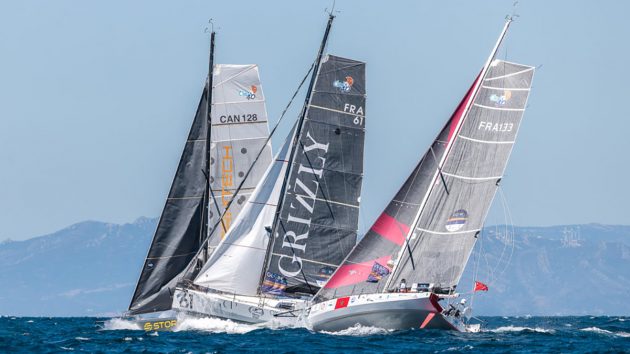The new Globe40 Race has started, with seven double-handed Class 40 teams setting off from the Moroccan city of Tangier on a 30,000-mile circumnavigation.
The inaugural Globe40 Race got underway on Sunday, June 26, with seven Class 40 teams starting from the Moroccan city of Tangier on a 30,000-mile circumnavigation.
The new double-handed Globe40 Race boasts several firsts, including being the first round-the-world race that departs from Africa.
It has also, unfortunately, had its first incident, with a collision shortly after the start between two competitors.
The Globe40 Race is created especially for the relatively affordable Class40 yachts. The skipper demographic also has a heavier focus on experienced amateurs rather than heavily sponsored professional teams.
Divided over eight legs the Globe40 Race has the option for the two-man teams to switch out crew at several points in the race, making it much easier for the largely amateur competitors to manage home life without the commitment of being offshore for nine months.
All the crews include at least one amateur and most are only crewed by non-professionals, albeit non-professionals with impressive amounts of blue water experience.

Brisk westerlies for Gryphon Solo II at the start of the Globe40 race in Tangier. Photo: Jean-Marie Liot/Globe40
The seven-boat fleet is a multicultural line-up for a Class40 offshore event, with teams from Japan, America, the Netherlands, Canada, one boat from France, and even a home entrant from Morocco.
Having only a single French team in a French organised race is surprising, especially given the depth of the Class 40 fleet in France. Only America is represented by two teams in the seven yacht race.
Fifteen boats originally signed up for the Globe40 but later dropped out due to reasons varying from covid concerns to the war in Ukraine.
Early into the Southern Ocean
One of the major challenges for competitors in the Globe40 will be its relatively early departure date for a circumnavigation.
After leaving Tangiers in June, the fleet will have a stopover in Cape Verde in July, and are likely to be rounding the Cape of Good Hope, South Africa at the end of July, in southern hemisphere mid-winter.

Dutch entry Sec Hayai is the oldest Class40 in the fleet. Photo: Jean-Marie Liot/Globe40
Dutch co-skipper Ysbrand Endt shared his concerns regarding the weather in the southern hemisphere: “It will be very hard so we certainly took it into consideration regarding whether we can handle big winds. For example, we have a fourth reef in our mainsail.
“We have a very strong J2 which is a little bit stronger than normally we would have chosen so we are able to go downwind in 50-55 knots.
“In the Southern Ocean, in winter time, it will be hard.”
Globe40 skipper ambitions
With varying levels of competitive experience in the fleet, the Globe40 skippers’ ambitions are equally mixed.
We spoke to the skipper of the Japanese entrant Masa Suzuki on board his 2nd generation Class40 Milai:
“My dream is to go round the world so I tried to make this dream come true before I was 40. I want to make it around the world safely, that’s my first concern and otherwise have a wonderful time seeing the world.”

Japanese skipper Masa Suzuki is fulfilling a lifetime sailing ambition by competing in the Globe40 round the world race. Photo: Jean-Marie Liot/Globe 40
Suzuki and Milai had already seen their share of trouble before the race. On passage to Tangier during the prologue leg from Lorient the Class40 was attacked by an orca whale off Spain, which saw the yacht have a bite taken from its starboard rudder. Fortunately the team was able to find a replacement before the race started.
Not all the teams are taking part simply out of a spirit of adventure, however. Some have their eye on the prize while others see this as a potential stepping-stone to greater things.
The Dutch team has been preparing for this race for two years and skipper Frans Budel has already completed a circumnavigation with his father. Their Class40 Sec Hayai is the oldest in the fleet.
Budel says: “I knew I wanted to sail around the world on this boat. It is an older boat but we think we have a competitive boat, a good boat and a little bit heavy, but for a race like this that might be better.”

Canadian entry Whiskey Jack. Photo: Jean-Marie Liot/Globe40
Drama at Globe40 start
The Globe40 is the brainchild of Manfred Ramspacher, who launched the event three years ago but had to delay the start by one year due to covid. The next edition is planned for 2025.
We asked him why a Frenchman would launch a new race from Africa? “Of course I had a few French harbours in my mind but very quickly we were in touch with the people of Tangier.
“The first time I came to Tangier I was very impressed. It was a great place for an event, it’s a new marina and the city is perfect for Europeans, it is close and the people speak so many languages.”
After an intense week of pre-start preparation work in the brand new marina in Tangier the seven yachts set out towards the start into fresh westerly winds gusting from the high teens to low 20s: perfect conditions for the mile-eating Class 40s to begin their nine months at sea.
Within the first 10 minutes, however, disaster struck for the French team.
The French entry The Globe en Solidaire, skippered by Eric Grosclaude, was only just out the gate when they tacked into the Canadian Whiskey Jack, skippered by Melodie Schaffer, and struck her amidships in an apparent port-starboard incident.

Fortunately the Canadians seemed to escape without too much damage and continued on, but the French team had to return to port with a broken bowsprit.
First stop will be the Cape Verde islands, followed by Mauritius, Auckland, Tahiti, Ushuaia, Recife, Grenada, and finishing in Lorient. Follow the fleet at globe40.com





